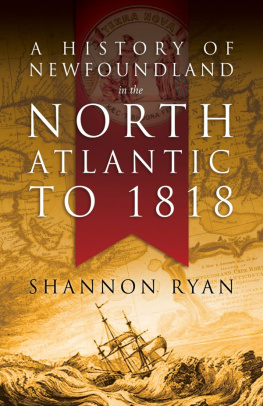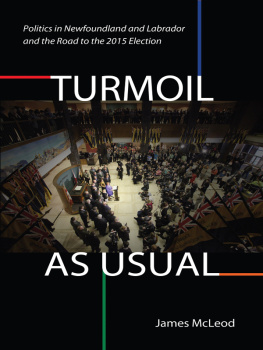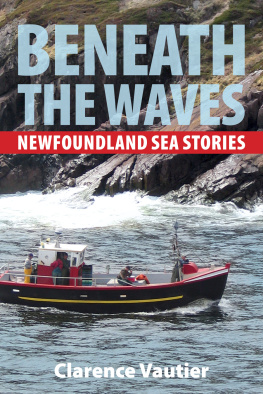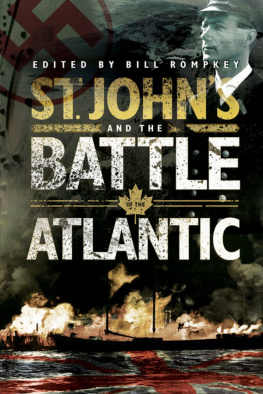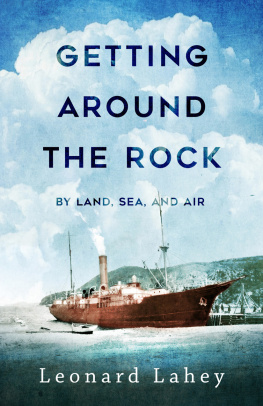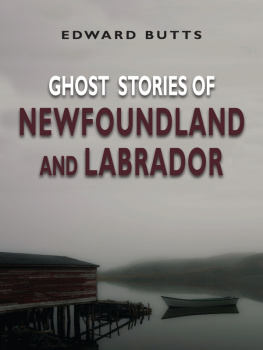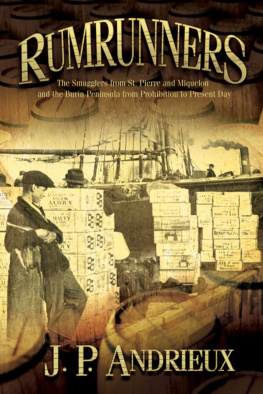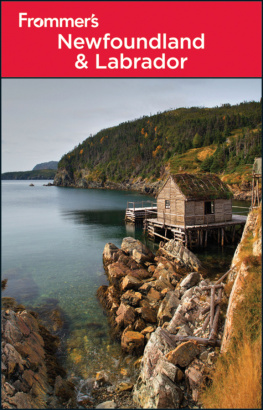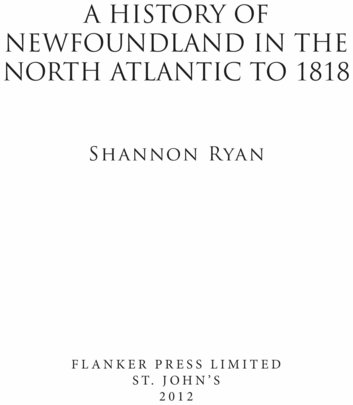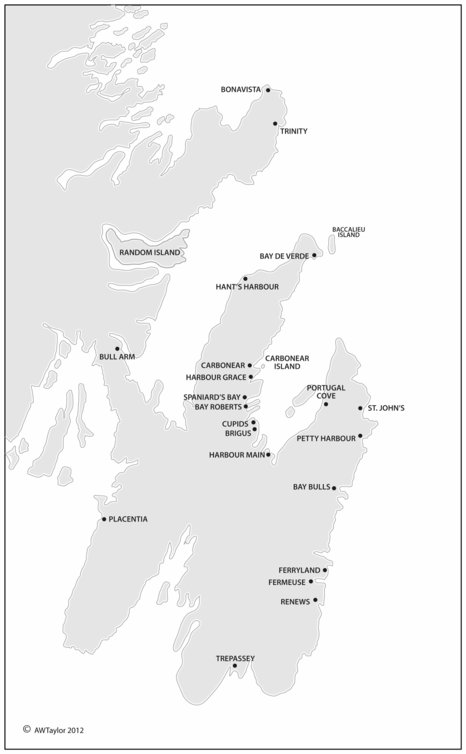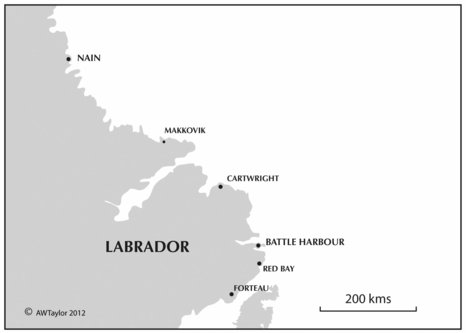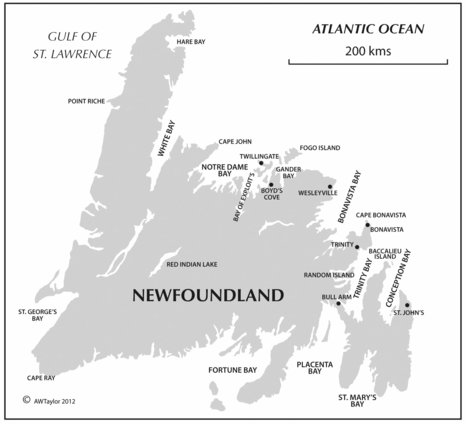A history of Newfoundland in the North Atlantic to 1818 [electronic resource] / Shannon Ryan.
Includes bibliographical references and index.
Electronic monograph.
Issued also in print format.
1. Newfoundland and Labrador--History--To 1763. 2. Newfoundland and Labrador--History--1763-1855. I. Title.
FC2171. R92 2012 971.801 C2012-905770-3
ALL RIGHTS RESERVED. No part of the work covered by the copyright hereon may be reproduced or used in any form or by any meansgraphic, electronic or mechanicalwithout the written permission of the publisher. Any request for photocopying, recording, taping, or information storage and retrieval systems of any part of this book shall be directed to Access Copyright, The Canadian Copyright Licensing Agency, 1 Yonge Street, Suite 800, Toronto, ON M5E 1E5. This applies to classroom use as well.
FLANKER PRESS LTD. PO BOX 2522, STATION C ST. JOHNS, NL CANADA
We acknowledge the financial support of the Government of Canada through the Book Publishing Industry Development Program (BPIDP) for our publishing activities; the Canada Council for the Arts which last year invested $24.3 million in writing and publishing throughout Canada; the Government of Newfoundland and Labrador, Department of Tourism, Culture and Recreation.
ACKNOWLEDGEMENTS
As happens in these cases, I owe thanks to many people and institutions for assistance with this manuscript. Chris You, then Head, History Department; Reeta Tremblay, then Dean of Arts; and the administration of Memorial University allowed me office space and office assistance so that I could write.
The following individuals helped me in various ways: Leslie Harris, President Emeritus, MUN, gave general advice and introduced me to Newfoundland history when he was an assistant professor and I a student in 1963 (Dr. Harris passed away 26 August 2008); the late Keith Matthews, History Department, MUN, supervised my MA thesis, and his D. Phil. thesis brought Newfoundland historical studies to new levels and is mentioned frequently in this work. The following read the manuscript and offered advice: Glyndwr Williams (D. Litt., MUN), Professor Emeritus, London, who supervised my PhD thesis; John Widdowson (D. Litt., MUN), former professor, Folklore Department, MUN, and former professor, University of Sheffield; Rex Brown, retired teacher and historian; Larry Small, retired folklorist, MUN; and Patrick OFlaherty (D. Litt., MUN), historian and author, Professor Emeritus, MUN. Mekaela Mahoney, PhD student, MUN, and my assistant, was an enormous help on this manuscript and also did the Index. Sarah Palmer, Professor of Maritime History, University of Greenwich, and an old friend, was always available for advice. Former students and colleagues Willeen Keough, PhD, (now at the History Department, Simon Fraser University); Maudie Whelan, PhD, academic and journalist; Carla Wheaton, PhD, Parks Canada; Assist. Prof. Terry Bishop-Stirling, History Department, MUN; Professor Sean Cadigan, present head, History Department, MUN; Jeff Webb, PhD, History Department, MUN; Prof. Lewis R. Fischer, History Department, MUN, D. Litt., U of Bergen; and Melvin Baker, PhD, Historian and University Archivist, MUN, were quite helpful. The staffs of the Maritime History Archives, Folklore and Language Archives, and Centre for Newfoundland Studiesall at MUN; the Provincial Archives of Newfoundland and Labrador; and the Newfoundland Collections at the St. Johns Public Library were also quite helpful.
My contacts and friends in London were part of this book in various ways: Robert Parker, British Library, now retired; and Sandra Tuppen, also British Library, both helped with accessing sources at the old and new British Library, as did other staff there. I also received assistance from the staffs of the Institute of Historical Research and of the neighbouring Senate House Library, including the Goldsmith Library (both under the University of London). And colleagues from my graduate studies in London, including Bob Holland, Commonwealth Studies, London (now retired) and Judith Rowbotham (now History Department, Nottingham Trent University), were helpful and encouraging.
Finally I must thank all who helped with the production of the final manuscript: Fran Warren, administrative officer, History Department, and Beverly Evans-Hong, Renee Clowe, and Betty Anne Lewis, secretaries in the History Department, MUN. And of course, the staff of Flanker Press, my publisher, especially their very able editor Iona Bulgin.
PREFACE
The story of English Newfoundland up to 1818 encompasses twothemes. First, there is the experience of a region in the NorthAmerican world that lacked a suitable agricultural base but had amajor supply of codfish that was in great demand. Unlike the furtrade, the other major early commercial activity in what is nowCanada, the production of codfish did not require year-roundresidence but did need numerous men, young and old, for the fishingseason each summer and early fall. The second theme involves theevolution of this successful migratory fishery (Newfoundland) fromthat of a fishing ship anchored on the Grand Banks in the NorthAtlantic to that of a Colony by 1818an evolutionary phenomenonthat occurred quickly over the two decades preceding 1818.
This present study draws upon my lectures to students atMemorial University of Newfoundland over a period of thirty-plus years. I always lectured on Newfoundland in the contextof the Atlantic colonial world and the European world becauseNewfoundlands development was affected in major ways by whatoccurred on both sides of the Atlantic: thus the digressions andasides. It will also become evident that this introductory history islimited in its geographical scope. I have concentrated on the eastcoast of the island, touching only briefly on the west and southcoasts, the northern peninsula, and the Labrador coast. Only inrecent years have historians, such as Ronald Rompkey, done muchoriginal work on the French Shore, for example, while much ofrecent scholarship on the Codroy Valley concentrates on the originsof European and Mikmaq settlement in the early 1800s.
This is intended to be a general history suitable as anintroduction to early Newfoundland history for students and, I hope,the general reader. In an article in the Newsletter: Royal HistoricalSociety (Spring/Summer 2006), Dr. Munch-Petersen, UniversityCollege, London, made some interesting points regarding popularhistory versus the scholarly monograph. Although he does notcondemn scholarly books and articles, Munch-Petersen believesthey are not enough; he summarizes his conclusion in two sentences:

